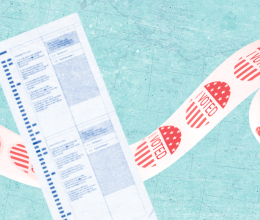Action Follows Federal Voting Rights Lawsuit Over the Issue; Groups Move to Dismiss Case Today in Light of Developments
COLUMBUS — The American Civil Liberties Union, ACLU of Ohio, and Lawyers' Committee for Civil Rights Under Law moved today to dismiss their federal lawsuit challenging Ohio's rejection of absentee ballots and absentee ballot applications based on flawed perceptions of mismatched voters' signatures, without allowing voters sufficient notice or opportunity to cure.
The groups brought the case, League of Women Voters of Ohio v. Frank LaRose, in July 2020. Today's action was prompted by a pair of directives issued by Ohio Secretary of State Frank LaRose following the lawsuit that require Boards of Elections to provide prompt telephone and email notice if a signature on an absentee ballot application or on an absentee ballot envelope appears to be a mismatch for the May 2021 primary.
"The Secretary stepped up and voluntarily issued directives covering both ballot applications and ballot envelopes, and it is our expectation that he will continue this salutary practice, which will substantially solve the notice and cure problem, in all future elections," offered Freda Levenson, legal director of the ACLU of Ohio.
In the 2020 statewide election, where the Secretary had issued a directive providing better notice for rejected absentee ballot envelopes, a total of 3,512,374 absentee ballots were cast, and only 441 were rejected for signature mismatches. Comparatively, in the 2016 General Election, about half as many absentee ballots were cast (1,890,069), but over 700 absentee ballots were rejected for signature mismatch. This data indicates that the expanded and extended notice procedures recommended by the plaintiffs would be extremely effective in curbing wrongful disenfranchisement.
"We are pleased that this lawsuit drew critical attention to the issues surrounding rejected ballots and ballot applications based on signature matches and that Secretary LaRose responded quickly to remedy the situation. We can only expect voting by mail to increase in popularity, and voters should feel confident that their absentee votes will count," added Jen Miller, executive director of the League of Women Voters of Ohio.
"All voter suppression tactics — no matter the shape or size — disproportionately affect voters of color. We are glad that our litigation raised awareness about the problems of rejecting absentee ballots without giving Ohioans an opportunity to cure," noted Andre Washington, president of the Ohio A. Philip Randolph Institute.
"We brought this lawsuit in order to better protect Ohio voters and ensure their votes are counted. We are pleased the state has taken steps to do just that," said Alora Thomas-Lundborg, senior staff attorney with the ACLU's Voting Rights Project.
"Our democracy demands participation, and by having the opportunity to cure minor issues with absentee ballots, voters will be encouraged to go out and make their voices heard. Our lawsuit brought attention to the fact that signature mismatching is a pernicious form of voter suppression, and it is past time Secretary LaRose issued these directives to remedy the process, but we are glad he finally did in the 2020 general election and we encourage him to adopt similar policies for future elections. All voters should be confident that no matter how they cast their votes, that those votes will count," said Jon Greenbaum, chief counsel and senior deputy director of the Lawyers' Committee for Civil Rights Under Law.
The case was filed in July 2020 on behalf of the League of Women Voters of Ohio, the A. Philip Randolph Institute of Ohio, and an individual.
The complaint is below.





